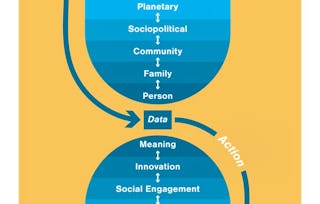This fourth of five courses examines the methodological approaches and research tools that inform our understanding of best practices in working with science teams, communities, and with data. The topics of this course include:

Social Determinants of Health: Methodological Opportunities

Social Determinants of Health: Methodological Opportunities
This course is part of Social Determinants of Health: Data to Action Specialization


Instructors: Daniel J. Pesut, Ph.D., RN, FAAN
Included with
Skills you'll gain
Details to know

Add to your LinkedIn profile
See how employees at top companies are mastering in-demand skills

Build your subject-matter expertise
- Learn new concepts from industry experts
- Gain a foundational understanding of a subject or tool
- Develop job-relevant skills with hands-on projects
- Earn a shareable career certificate

There are 5 modules in this course
The purpose of this module is to examine community-based participatory research (CBPR) and evaluate its potential applications in data-to-action initiatives. Lesson one will define CBPR, as we discuss its origin and relation to collective impact. We will also review the goals, purpose, benefits and characteristics of CBPR as we compare it to traditional research methods. In lesson two, we will explore potential measurement strategies for analyzing CBPR outcomes and data-to-action interventions. We will also consider how CBPR success is measured and how data can be used to amplify community voices.
What's included
3 videos4 readings2 assignments1 discussion prompt5 plugins
This module will introduce the principles of team science and examine how team science can be used to enhance data-to-action initiatives. In lesson one, we will define team science, as we discuss how it is related to collective impact and CBPR. We will also review recommendations made by the National Academies Committee on the Science of Team Science for improving team science effectiveness. Lesson two will focus on the opportunities and challenges for team science in communities, as we further discuss incorporating community perspectives into team science research. We will also evaluate how to measure team science outcomes, as we consider how team science can add perspective and voice to data.
What's included
2 videos4 readings2 assignments1 discussion prompt3 plugins
This module will focus on the importance of community partnerships in collecting and analyzing community-level data that can be integrated into data-to-action initiatives. Lesson one will define key terms, and introduce the concept of whole-person health. We will also explore how community data can be used to advocate, influence and create policy to support health equity. In lesson two, we will examine the use of simplified plain language in the context of health literacy, as we discuss how to assess the usability of community-validated plain language terms. Lesson three will introduce the MyStrengths+MyHealth assessment, as we review the implications of collecting community-based social determinant of health data. Finally in lesson four, we will evaluate a community-level data exemplar, as we consider how to translate whole person health and community-level data into community-driven health initiatives.
What's included
5 videos8 readings2 assignments1 discussion prompt
In this module, we will examine informatics as a potential methodology and resource to inform data-to-action initiatives. Lesson one will define key concepts including informatics, knowledge complexity, and knowledge management. Building on these concepts, we will investigate the levels of knowledge management proposed by Verna Allee. We will also consider the different perspectives on the proposed creation of a new social informatics specialty. Building on our understanding of knowledge management, in lesson two, we will explore knowledge representation structures. We will also analyze the use of publicly available population health records as contextual information to manage knowledge and data for action to reduce health disparities. In addition, we will evaluate knowledge representation structures of evidence-based social determinants of health interventions. Finally, we will explore some informatics applications including the Population Health Record and the WHO Health Equity Assessment Toolkit (HEAT).
What's included
2 videos4 readings2 assignments1 discussion prompt3 plugins
This module will focus on analyzing, displaying and interpreting social determinants of health data, with a particular focus on comparing health outcomes by groups. Lesson one will provide an overview of ANOVA analysis and line graph visualization. In lesson two, we will learn how to conduct ANOVA analyses and create line graphs in R. Using the NHANES dataset, we will compare the mean Hgb a1c by education level. Using the Omaha System dataset, we will compare the mean change in status by number of problems. Finally, we will discuss how to interpret the results of our analysis as we visualize our findings using line graphs.
What's included
2 videos4 readings1 peer review1 discussion prompt1 ungraded lab3 plugins
Earn a career certificate
Add this credential to your LinkedIn profile, resume, or CV. Share it on social media and in your performance review.
Instructors


Offered by
Explore more from Health Informatics
 Status: Free Trial
Status: Free TrialUniversity of Minnesota
 Status: Free Trial
Status: Free TrialUniversity of Minnesota
 Status: Free Trial
Status: Free TrialUniversity of Minnesota
 Status: Free Trial
Status: Free TrialUniversity of Minnesota
Why people choose Coursera for their career

Felipe M.

Jennifer J.

Larry W.

Chaitanya A.

Open new doors with Coursera Plus
Unlimited access to 10,000+ world-class courses, hands-on projects, and job-ready certificate programs - all included in your subscription
Advance your career with an online degree
Earn a degree from world-class universities - 100% online
Join over 3,400 global companies that choose Coursera for Business
Upskill your employees to excel in the digital economy
Frequently asked questions
To access the course materials, assignments and to earn a Certificate, you will need to purchase the Certificate experience when you enroll in a course. You can try a Free Trial instead, or apply for Financial Aid. The course may offer 'Full Course, No Certificate' instead. This option lets you see all course materials, submit required assessments, and get a final grade. This also means that you will not be able to purchase a Certificate experience.
When you enroll in the course, you get access to all of the courses in the Specialization, and you earn a certificate when you complete the work. Your electronic Certificate will be added to your Accomplishments page - from there, you can print your Certificate or add it to your LinkedIn profile.
Yes. In select learning programs, you can apply for financial aid or a scholarship if you can’t afford the enrollment fee. If fin aid or scholarship is available for your learning program selection, you’ll find a link to apply on the description page.
More questions
Financial aid available,
¹ Some assignments in this course are AI-graded. For these assignments, your data will be used in accordance with Coursera's Privacy Notice.

